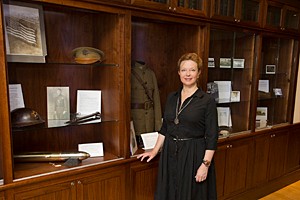
UC Faculty Director of WWI and the Arts: Sound, Vision, Psyche, Reveals How Institute Examines WWI Beyond Europe
The University of Cincinnati will host the summer institute, WWI and the Arts: Sound, Vision, Psyche, from June 22 through July 19. Funded by a $192,000 grant from the National Endowment for the Humanities, the institute will bring together 12 instructors (including UC World War I experts) and 21 World War I scholars to broaden research about the Great War; to develop new analytical and narrative tools for conveying the reality of the World War I time period in Europe, Asia and Africa; and to create content about the war to share worldwide through the
Elizabeth Frierson, a UC associate professor of history and faculty director of the World War I institute, says the institute will expand cultural understandings of the war beyond the Western front, exploring the roles of African-Americans who served in the war (namely the Harlem Hellfighters), Indian Colonial soldiers (who served in the British Imperial Army) as well as citizens from Africa and Asia who fought in the war.
Recent work in European, Russian, Ottoman and colonial history has provided us resources in English translation that can expand our scholarship and teaching beyond the European theater of war, and thats what our institute proposes to do, says Frierson.
Frierson says the idea for the institute began when she was approached by Evans Mirageas, The Harry T. Wilks Artistic Director of the Cincinnati Opera, who is bringing the American opera, Silent Night, to Cincinnati this summer. The event is among a number of citywide observances of the 100th anniversary of the Great War. The opera,
received the Pulitzer Prize for Music in 2012 and was inspired by the Christmas truce of 2014, when World War I enemies laid down their weapons and celebrated the holiday together.
He (Evans Mirageas) was looking to bring more scholarly content to the events around the opera when he approached the UC Department of History, says Frierson. I applied for the National Endowment for the Humanities grant, and the institute has been in the planning since the grant was awarded last August.
Top scholars from around the nation will come together at the institute to share perspectives on the war from the angles of history, culture, the arts and medicine. Some aspects of modern medicine, emergency medicine, were profoundly affected by World War I, because this war was about the meeting of the body with the industrial world, says Frierson. It showed mechanized warfare on a massive scale for the first time, and ways of damaging the body became more and more effective in the first years of the war. We saw the development of the tank, the military submarine, more efficient field hospitals and improved treatment on the battlefield. The military was also seeing its first large-scale encounters with that they called shell-shock, now identified as Post Traumatic Stress Disorder (PTSD).
World War I led to the collapse of the Ottoman Empire and as a result, the Middle East was laid open to be ruled by westerners. There were no modern states of Iraq or Syria or Lebanon or Palestine before the war. The war had a tremendous effect on the former Ottoman territories. The war brought down three great, land-based territories: the Ottoman Empire, the Russian Empire and the Austro-Hungarian Empire.
Frierson adds that the institute will also examine servicemen beyond white Europeans in the trenches. How many people knew the British Imperial Army contained some 1.5 million Indian Colonial troops? They faced terrible racism. Whats also remarkable is the number of African-Americans who volunteered to serve in this war.
In exploring how the war influenced the arts, scholars will visit various sites and join a number of Cincinnati institutions commemorating the anniversary of the war, including the Cincinnati Opera and Cincinnati Museum Center. Well explore auditory, visual and healing arts as ways to analyze, interpret and narrate the war at the front and at home, says Frierson.
These newly burgeoning fields of WWI studies beyond Europe, and beyond military, diplomatic and political history, are developing in the age of social history, the history of ordinary men and women. Leading scholars of World War I in Europe, Russia, North Africa, the Middle East and the U.S. our institute leaders will all explore these rich sources with precision and insight, says Frierson.
Related News: UC Joins Citywide Events Observing the 100th Anniversary of World War I
Related Stories
UC celebrates record graduating class at commencement
April 25, 2024
UC celebrated its doctoral hooding and master's recognition ceremony at Fifth Third Arena as part of its three-day commencement for the largest graduating class in university history.
The 2024 Toast recognizes achievements of Lindner’s Business...
April 25, 2024
The Carl H. Lindner College of Business Office of Inclusive Excellence hosted its annual Toast event for the Business Fellows program April 18 at The Graduate Hotel Cincinnati.
2024 Daniel Drake Medals to be awarded April 27
April 24, 2024
The UC College of Medicine will award three people with 2024 Daniel Drake Medals April 27.
